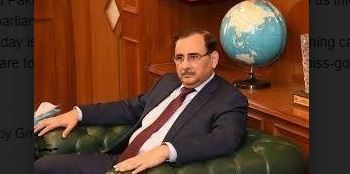DNA
Islamabad, Sep 25: The Federation of Pakistan Chambers of Commerce & Industry’s Businessmen Panel (BMP) has fully backed the call of the United Nations as well as the Prime Minister to ease debt pressure on Pakistan by suspending international debt repayments and restructuring loans with a view to provide immediate humanitarian support to the flood-hit country.
FPCCI former president and BMP Chairman Mian Anjum Nisar supported Prime Minister Shehbaz Sharif’s call to the international community to write off the debts of Pakistan, as the devastating flood has shattered the economy of the developing nation. The world community should think of some kind of a debt write-off for Pakistan, as its major chunk of income is being spent on debt servicing, making it very vulnerable, he said.
He said that the central bank’s foreign exchange reserves have declined stridently during last couple of months mainly owing to external debt servicing. He argued that the creditors should consider debt relief so that Pakistan could prioritize financing its disaster response over repaying loans. Pakistan’s payments could be suspended at the earliest to free up fiscal space for urgent disaster response and recovery, which have been aggravated by the catastrophic floods, he added. He also proposed some restructuring or debt swaps, whereby creditors would forgo repayments in return for Pakistan agreeing to invest in climate change-resilient infrastructure. Pakistan, whose external debts total about $100 billion, was struggling with a balance-of-payments crisis that strained its ability to repay loans even before unprecedented flooding recently. The country, which has been particularly hard hit by the global surge in commodity prices, received a $1.1 billion bailout from the IMF last month. The disaster has amplified the challenges, affecting more than 30 million people and causing an estimated $30 billion in damage. He argued the creditors to find a longer-term solution that would involve lowering Pakistan’s debts down to a sustainable level to enable the government to put people’s needs first.
“The BMP calls for an outright cancellation of debt payments, stating that the poor countries must be given debt relief by G20. We fully support the government which has already reached out to bilateral creditors to see if it can get some relief, as the country pays a large chunk of its tax money to foreign creditors.”
Last year, Pakistan paid $11.6 billion to lenders, which is more than its central bank has in its reserves at the moment, he added. “It is very welcome that Pakistan has called for a moratorium on interest payments, as most of their debt consist of loans, which are borrowed to pay off previous loans, trapping them in a vicious debt cycle.”
The FPCCI former president said that country’s reserves had been declining due to scheduled foreign debt payments. Although, during the last few weeks, the central bank also received some inflows, however, those inflows were less than the outflows, because of which the foreign exchange reserves posted a sharp decline.
He asked the world community to think of full debt write-off for countries like Pakistan that will help them to cope with the post-flood sufferings. He observed that Pakistan lacks fiscal space and a proper health system. Therefore, the most appropriate response that the IMF, World Bank and G20 countries can give, at the moment, is abandoning the loan instead of a temporary relief, he said.
He pointed out that there is no benefit of interim debt relief on principal and interest payments, as the suspension period for debt relief will remain only for few months and all debt service falling due in this period will be packaged into a new loan on which the repayments will again start after a short period, to be paid over three years. He asked them to extend grants to Pakistan instead of loans. He said that the debt servicing would eat up more than two-fifth of country’s total budget, as it is the top category in expenditures in FY23.
The FPCCI former chief said that the country’s economy is witnessing an unprecedented damage under the government’s controversial agreement with the International Monetary Fund, as it has wreaked havoc on the industry by unleashing a slew tsunami of unbearable hike in prices of utility. The government has also indebted Pakistan to the point of crisis, and has now taken us into a situation where the central bank is being made totally unaccountable to Pakistan’s parliament, which does not seem to be sound.
What the businessmen see today is a very worrying meltdown without any matching capacity for increasing direct taxation or actually widening the tax net. As a result, presently we are totally exposed to debt, impoverishment and miss-governance on an epic scale, he said.












